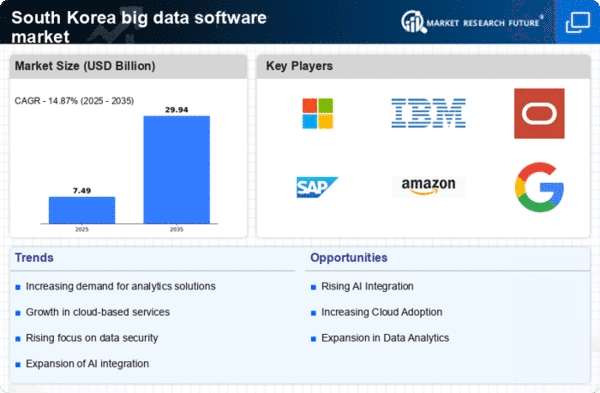Rising Demand for Data Analytics
The increasing demand for data analytics in South Korea is a pivotal driver for the big data-software market. Organizations across various sectors are recognizing the value of data-driven decision-making. In 2025, the analytics market is projected to grow by approximately 15%, indicating a robust appetite for advanced analytical tools. This trend is particularly evident in industries such as finance, healthcare, and retail, where data insights can lead to improved operational efficiency and customer satisfaction. As businesses strive to remain competitive, the integration of sophisticated analytics solutions becomes essential. Consequently, the big data-software market is likely to experience significant growth as companies invest in tools that enable them to harness the power of their data effectively.
Government Initiatives and Support
Government initiatives in South Korea are playing a crucial role in propelling the big data-software market. The South Korean government has launched various programs aimed at fostering innovation and technological advancement. For instance, substantial funding has been allocated to support research and development in big data technologies. In 2025, government investments in this sector are expected to exceed $500 million, reflecting a commitment to enhancing the country's data infrastructure. These initiatives not only encourage local startups but also attract foreign investments, thereby expanding the market landscape. As a result, the big data-software market is poised for growth, driven by supportive policies and funding aimed at promoting data utilization across industries.
Growing Focus on Predictive Analytics
The growing focus on predictive analytics is emerging as a significant driver for the big data-software market in South Korea. Businesses are increasingly adopting predictive models to forecast trends, customer behavior, and market dynamics. This shift is expected to enhance decision-making processes and optimize resource allocation. In 2025, the predictive analytics segment is projected to account for approximately 25% of the overall analytics market, underscoring its importance. Industries such as retail, finance, and healthcare are particularly keen on utilizing predictive analytics to gain a competitive edge. As organizations recognize the potential of predictive insights, the demand for big data-software solutions tailored for predictive analytics is likely to surge.
Emergence of IoT and Smart Technologies
The emergence of Internet of Things (IoT) and smart technologies is significantly influencing the big data-software market in South Korea. With the proliferation of connected devices, vast amounts of data are generated daily, necessitating advanced software solutions for data management and analysis. In 2025, it is estimated that the number of connected devices in South Korea will reach over 30 million, creating a substantial demand for big data solutions. This trend is particularly relevant in sectors such as manufacturing, transportation, and smart cities, where real-time data processing is essential. Consequently, the big data-software market is likely to expand as organizations seek to leverage IoT data for enhanced operational efficiency and innovation.
Increased Investment in Data Infrastructure
Increased investment in data infrastructure is a critical driver for the big data-software market in South Korea. As organizations recognize the importance of robust data management systems, they are allocating significant resources to enhance their data capabilities. In 2025, it is anticipated that spending on data infrastructure will surpass $1 billion, reflecting a strong commitment to building scalable and efficient systems. This investment encompasses cloud storage, data warehousing, and advanced analytics platforms, all of which are essential for effective data utilization. As companies strive to improve their data handling capabilities, the big data-software market is expected to benefit from this influx of investment, leading to the development of more sophisticated software solutions.
















